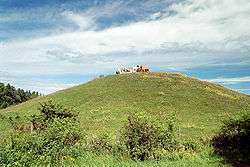Skalunda
Coordinates: 58°33′N 12°59′E / 58.550°N 12.983°E

Barrow of Skalunda
Skalunda is a village in Västergötland, Sweden and the site of Skalunda Barrow (Swedish: Skalunda hög), a historic burial mound. Hög, from the Old Norse word haugr, means mound or barrow. The modern English cognate, still in use, is "howe", "how", or "hoo", as in Sutton Hoo.
At the church, there are two runestones and to the west of the church there is the Barrow of Skalunda which is the largest one in Västergötland. Skalunda Barrow is one of the larger barrows in Scandinavia. It measures 65 metres across and it is 7 metres high. Next to the barrow there is a stone circle. This suggests that Skalunda was an important location dating to the Iron Age.
Skalunda was one of the eight royal estates of early medieval Västergötland (cf. Uppsala öd). Moreoever, the names of two homesteads, Lagmansgården and Lagmanstorp, in the neighbourhood show that the Geatish lawspeakers used to reside at Skalunda.
History
Birger Nerman, a Swedish archaeology professor and director of the Swedish Museum of National Antiquities, considered the Barrow of Skalunda to be the most likely burial site of the hero Beowulf, a legendary Geatish king. Skalunda is not far from a place called Årnäs, which is the same name as Earnaness where the hero died in the epic Beowulf, and it is located on a major promontory and near a minor one. The barrow has not yet been excavated.
References
- Burström, Mats: (1996) Skalunda hög, historier kring en hög Mellan bronssköld och JAS-plan. Glimtar av Lidköpingsbygdens historia. pages 79–92.
- Ewald, Gustaf: (1950) Är Skalunda hög kung Beowulfs grav? Västgöta-Bygden nr 1, pages 335–336. (Om *Birger Nermans och °Carl Otto Fasts idéer angående hednatima kungars gravplats.)
- Flink, G.: (1986) Landet mellan Larva Bäsing och Skalundahögen Arkeologi i Sverige 1982–3.
- Nerman, B.: (1956) När kom Västergötland under svearnas välde? Västergötlands fornminnesförenings tidskrift
- Svärdström, Elisabeth: (1958–1970) Västergötlands runinskrifter
- Thorstensson, Gunnar: (1996) Skalundahögen Västgötabygden, tidskrift för hembygdsarbete, natur- och kulturminnesvård. Västergötlands hembygdsförbund . Sid 10–11.
Other sources
- The article Skalunda on the site of the Foteviken Museum. Retrieved May 29, 2007.